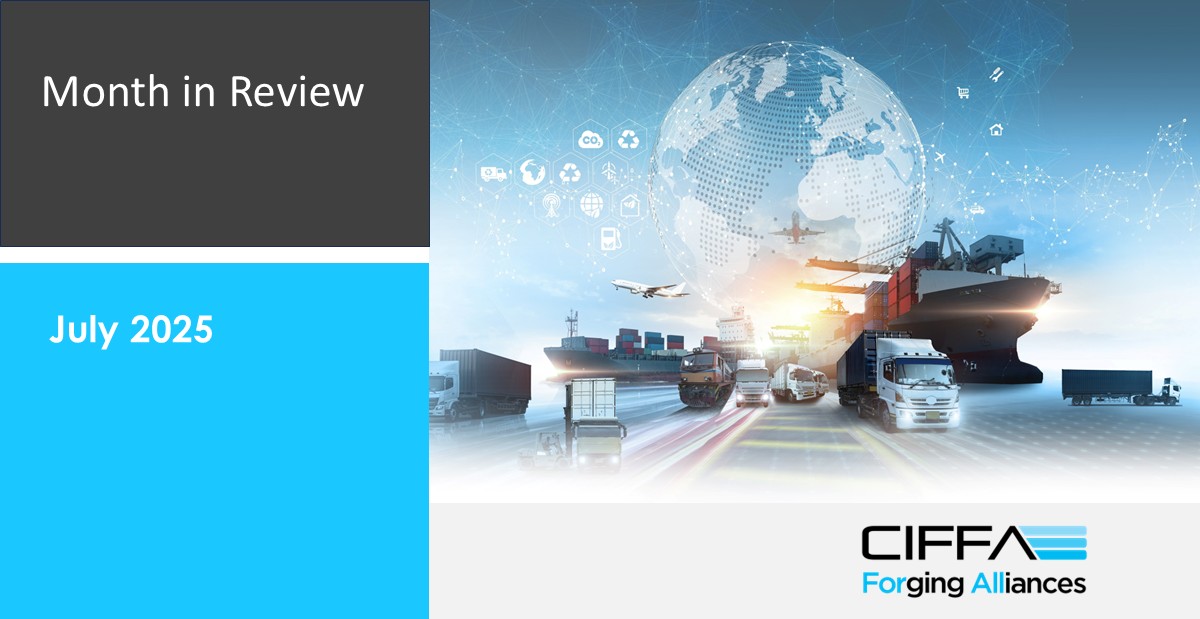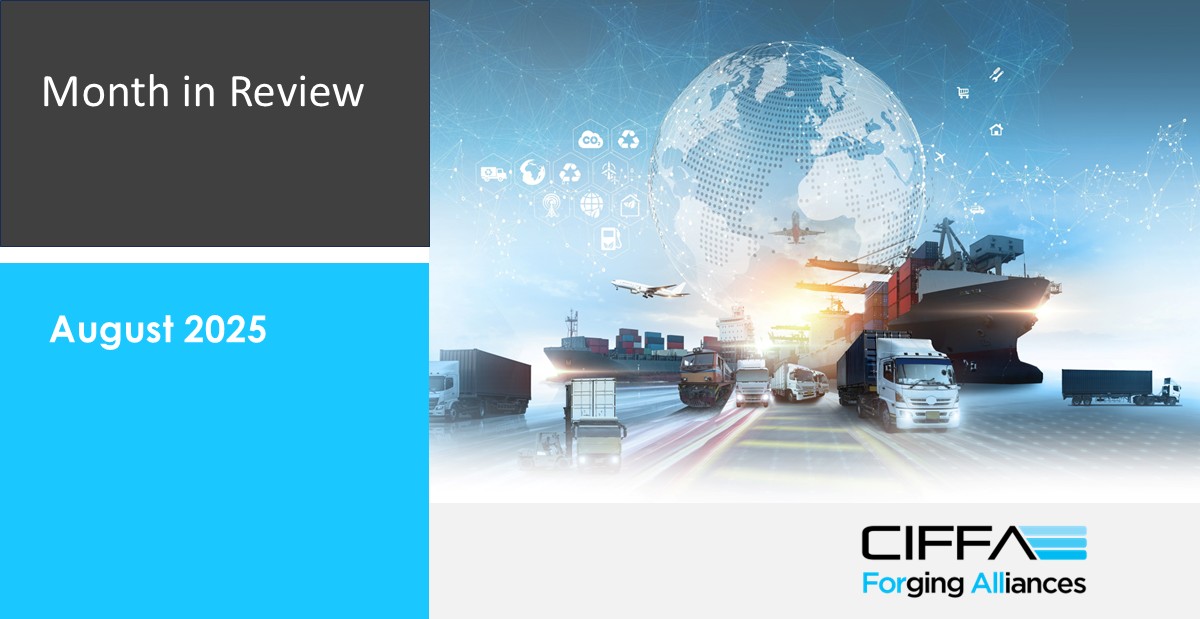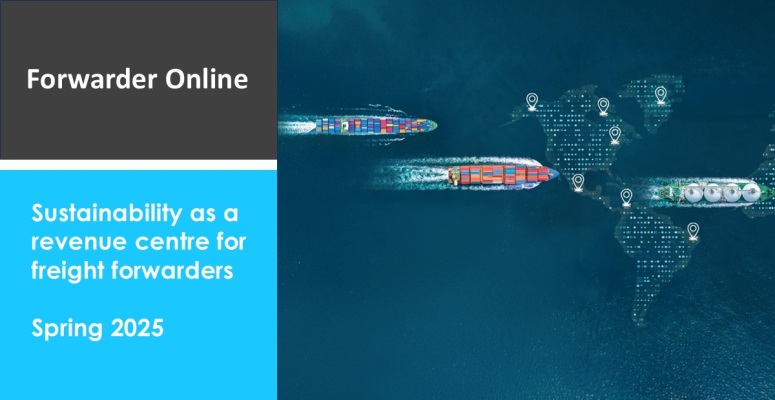
Month in Review – July 2025
Maritime
July 1: Indian Ban on Ships Carrying Pakistani Goods Causes Increased Freight Prices and Longer Transit Times – Marine Insight
Per a research report published recently, India’s ban on vessels carrying Pakistani goods from anchoring at its port facilities has led to a rise in freight prices and longer transit times.
After the terror attack in Pahalgam on April 22, the ban, which went into effect on May 2, prevents the direct or indirect import or transit of cargo produced in or exported from Islamabad.
Importers from Pakistan have stated that the development has led to several logistical problems.
Analysts say that, because of the restriction, mother ships can no longer arrive at Pakistan’s ports, which leads to delays in shipment by 30 to even 50 days.
Traders have resorted to using feeder ships, which are expensive and are driving up import prices. The cost of shipping and insurance has also risen, according to exporters.
July 3: Ocean Carriers Warn of No End in Sight for Global Shipping Logjam – Supply Chain Brain
It’s easy to blame the tariffs from the Trump administration for the uncertainty plaguing global supply chains. But a variety of other factors – from the dangers of transiting the Suez Canal to port congestion – have compounded delays, driven up shipping costs and made long-term planning increasingly difficult for importers and exporters alike.
“Uncertainty is everywhere in sea logistics,” said Kuehne + Nagel executive VP Bill Rooney on June 17. “Don’t take your crash helmets off; this isn’t coming to an end anytime soon.”
Rooney pointed to how the Global Trade Policy Uncertainty Index – which research firm Econovis uses to track heightened periods of economic turmoil – currently sits at a rating of 500. Comparatively, the index hovered around 250 at its highest point during the pandemic, and is now five times what it was during the 1971 “Nixon shock” that upended decades of global monetary stability when the U.S. moved the dollar off the gold standard.
July 6: Merchant Vessel Attacked in Red Sea – American Shipper
United Kingdom Maritime Trade Operations on July 6 said that it received a report that light vessels had opened fire with small arms and self-propelled grenades. Published reports identified the vessel as the Magic Seas, a Liberian-flagged bulk tanker, and that the crew of 23 was abandoning ship after it was set afire by the attacks and sinking.
The UKMTO said that armed security aboard the merchant vessel returned fire during the attack, which occurred 51 nautical miles southwest of Hudaydah, Yemen.
Houthi media and the U.S. armed forces were aware of the attack but offered no details.
July 10: Roberts Bank Terminal 2 Procurement Underway, with Vancouver Fraser Port Authority Issuing a Request for Qualifications for a Construction Team – Vancouver Fraser Port Authority press release
The Vancouver Fraser Port Authority has started its search to find the best qualified team to progress construction planning and build the landmass and wharf component of the Roberts Bank Terminal 2 Project.
The contract includes the delivery of an approximately 100-hectare marine landmass, 35-hectare widened causeway, 1,300-metre wharf structure and berth pocket, and expanded tug basin. To support the port authority’s environmental plan, the contract also includes the construction of a marine terminal fish passage to support juvenile salmon migration, and the civil works for onsite habitat enhancement and the South Arm Jetty Tidal Marsh Project – a priority project for First Nations to benefit fish and wildlife.
The request for qualifications marks the first step in the procurement process. Interested construction teams must provide an interim submission confirming their interest by September 18, and submit details of their qualifications by September 25. The port authority will shortlist three teams this fall, who will then be invited to submit a proposal.
July 11: Houthis Vow to Block All Shipments Linked to Israel Through Declared Zone – Marine Insight
Yemeni Houthi leader Abdul-Malik al-Houthi has said that no company will be allowed to transport goods linked to Israel through areas they consider part of their operational zone at sea. On July 10, the Houthi leader said that no company is allowed to move goods for what he called the “Israeli enemy” through the declared zone. He added that their position on this remains unchanged.
This statement came shortly after the group carried out two deadly attacks in the Red Sea last week. The Houthis sank two ships and killed four seafarers. These were the first deadly attacks after several months of calm in the region.
July 15: Manitoba Must Prepare for Year-Round Hudson Bay Shipping Access, Port Owner Says – CBC News
Year-round shipping access through Hudson Bay is a possibility that Manitoba needs to get ready for, and the head of the group that owns the Port of Churchill says it’s possible to strike a balance between environmental concerns and tourism interests.
Trade tensions between Canada and the U.S. have sparked renewed interest in the Port of Churchill, with Manitoba Premier Wab Kinew saying it could be a good option for increased trade with Europe and expansion could fit with the federal government’s plan for nation-building infrastructure.
The port, which has a brief operational window each summer, is owned and operated by Arctic Gateway Group, a partnership of dozens of First Nations and Hudson Bay communities.
Chris Avery, Arctic Gateway Group’s CEO, said University of Manitoba researchers expect climate change will completely open up sea lanes in Hudson Bay within the “generation of our kids or our grandkids.”
“We need to start preparing for that,” he said at a news conference.
July 18: Container Shipping Expected to Face Overcapacity Until 2028 – Global Trade
The container shipping industry is heading into a prolonged period of overcapacity, with analysts warning that supply will continue to outpace demand until at least 2028.
According to Braemar’s latest Quarterly Container Fleet Statistics, a surge in new vessel orders and a sharp drop in scrapping activity are widening the supply-demand gap. The firm reports that 2.3 million TEU of new capacity was ordered in the first half of 2025, only slightly down from the record 3.8 million TEU ordered in the second half of 2024.
A growing trend in regional and sub-panamax vessel investment is also reshaping the orderbook. While large ship orders – those 14,000 TEU and above – remain active, smaller vessel orders have picked up sharply. In the first half of 2025 alone, 74 feeder and regional vessels (up to 4,000 TEU) were ordered, nearly matching the full-year total for 2024.
Despite aging fleets – 32% of smaller ships are over 20 years old, a figure expected to rise to nearly 50% by 2030 – demolition activity has stalled. Only 10 ships totaling 5,454 TEU were scrapped in H1 2025, down sharply from 48,600 TEU during the same period last year, according to Alphaliner.
July 18: Matson Suspends Shipping EVs, Citing Hazards of Lithium-ion Batteries – The Maritime Executive
Matson surprised customers last week with an announcement that, effective immediately, it would suspend transporting battery-powered electric or plug-in hybrid electric vehicles due to the hazardous material classification of their lithium-ion batteries.
In a letter sent to customers, the company wrote, “Due to increasing concern for the safety of transporting vehicles powered by large lithium-ion batteries, Matson is suspending acceptance of used or new electric vehicles (EVs) and plug-in hybrid vehicles for transport aboard its vessels. Effective immediately, we have ceased accepting new bookings for these shipments to/from all trades.”
The letter also said: “Matson continues to support industry efforts to develop comprehensive standards and procedures to address fire risk posed by lithium-ion batteries at sea and plans to resume acceptance of them when appropriate safety solutions that meet our requirements can be implemented.”
July 23: Completion of Delta Terminal Upgrades Expands Auto Trade Capacity at Port of Vancouver – Maritime Magazine
The Vancouver Fraser Port Authority and Wallenius Wilhelmsen announce the completion of terminal upgrades as part of the Annacis Auto Terminal Optimization Project in Delta, British Columbia.
Construction, which began in 2022, involved consolidating two existing automobile terminals – Annacis Auto Terminal and Richmond Auto Terminal – into a single facility at the Annacis Auto Terminal.
The improvements will allow the terminal to handle up to 480,000 vehicles annually (36% increase in capacity). The project includes the creation of 60 rail car spots through the expansion of two existing terminal rail yards, a new vehicle processing building, along with the installation of eight electric vehicle charging stations. Additionally, the project frees up valuable industrial land for other trade-enabling activities in the future, bolstering further economic growth in the region.
July 25: Rhine River Levels Rise in Germany After Rain, Ships Load More Cargo – American Journal of Transportation
Rain has sharply raised water levels on the river Rhine in Germany, allowing ships to take on bigger loads, and only northern sections of the river are still too shallow for cargo vessels to sail at full capacity, commodity traders said on July 25.
Dry weather and a heatwave in June and July meant the river became too shallow for vessels to sail fully loaded. Ship operators imposed surcharges on freight rates to compensate for vessels sailing partly empty, increasing costs for cargo owners.
Shallow water levels continue to hinder shipping in northern sections of the river in Germany, including Duisburg and Cologne, but vessels can sail around 70% full, traders said.
July 28: Houthis to Target Foreign Ships Linked to Companies Dealing with Israeli Ports – Marine Insight
Yemen’s Houthis said in a statement that they will target all foreign vessels linked to Israel, irrespective of their destination, stating retaliation for what they called the blockade and starvation campaign of Israel against the people of Gaza.
Houthis will target all ships of companies that deal with Israeli ports, irrespective of their nationality and wherever they may be, within the reach of the Houthis, said Houthi spokesperson Yahya Sarea.
He said that Houthis are warning all companies to stop their dealings with Israeli ports and called on all nations to pressure Israel to stop its aggression and lift the blockade on the Gaza Strip, if they want to avoid the escalation.
July 29: Update on Construction Timeline for the Port of Montreal Contrecœur Expansion Project – Port of Montreal press release
The Montreal Port Authority (MPA) has submitted its notice of intent to begin preliminary construction work for the Port of Montreal’s Contrecœur expansion as early as September 29, pending receipt of the final required approvals.
“This step allows us to meet the conditions required to move forward with a project that positions Quebec and Canada more strongly to diversify international trade,” said Julie Gascon, President and CEO of the MPA. “Once all the necessary approvals are in place, we’ll be ready to begin work on this major strategic project that is essential to the future of our supply chains.”
The initial work will focus primarily on preparing the project site for more significant construction activities, which could take place in 2026. All work remains contingent upon receiving the appropriate regulatory approvals. The full project timeline and a description of the planned activities are available on the Canadian Impact Assessment Registry website.
Rail
July 29: Union Pacific Railroad to Acquire Norfolk Southern in $85-Billion Deal – Progressive Railroading
Union Pacific Corp. and Norfolk Southern Corp. have announced an agreement in which UP will acquire NS in a stock and cash deal that would create the first transcontinental railroad in the United States.
If approved by the Surface Transportation Board and other regulators, the merger would create a U.S. transcontinental railroad that would connect over 50,000 route miles from the East Coast to the West Coast. The combined railroad would link about 100 ports and nearly every corner of North America.
July 29: Shippers Line Up Against U.S. Railroad Mergers – FreightWaves
Groups representing rail shippers say they would be opposed to the creation of a transcontinental railroad in the U.S., arguing that further consolidation in the industry would reduce their competitive options, lead to higher rates, and worsen service.
Union Pacific and Norfolk Southern announced that they had come to an agreement for UP to acquire NS for stock and cash worth $85 billion.
It’s further expected that BNSF and CSX for competitive reasons would eventually pursue a similar agreement.
The National Industrial Transportation League, the American Chemistry Council, and the Freight Rail Customer Alliance are watching warily as a final round of mergers would leave the U.S. with a pair of transcontinental Class I systems.
Trucking
July 4: B.C. Truckers Face Delays as RoadSafetyBC Struggles with Medical Form Backlog – CityNews Vancouver
Mark Swan, a veteran commercial truck driver with over 30 years of experience, expected routine processing when he submitted his mandatory medical exam last summer – until he checked his driver’s abstract.
“[I found that] the government hadn’t processed my B.C. medical examination for a commercial driver’s license, from about a year ago. July, actually, last year,” Swan told CityNews.
He would not have known without checking, since no notice was sent, Swan explains. And he is not alone. The Ministry of Public Safety reports RoadSafetyBC is still processing medical forms from May 2024, with a backlog of 196,000 documents.
“It means you’re not supposed to be able to operate a vehicle, you can’t engage with any activities with ICBC, in regard to insurance, so renewing, transferring, anything along those lines.”
While the Ministry claims drivers with licences on hold can still operate legally, Swan warns a police stop could complicate things.
July 10: Another Broker Liability Case Knocks at the U.S. Supreme Court Door – FreightWaves
Even as the U.S. trucking legal community looks for the possibility of the Supreme Court being asked to review a court decision that put Total Quality Logistics on the losing side of the issue of broker liability, there is another federal case on the same subject that already is on the nine justices’ formal requests for high court certiorari (an order by which a higher court reviews a decision of a lower court).
Legal filings heated up last week in the case of Shawn Montgomery vs. Caribe Transport II, a carrier. 3PL giant C.H. Robinson, which hired Caribe Transport, also is a defendant.
July 17: B.C. Authorities Put More Than Half of Inspected Trucks OOS During Enforcement Blitz – Today’s Trucking
The B.C. Highway Patrol and its partners placed more than half of the 109 commercial vehicles they inspected out of service (OSS) during a recent two-day enforcement blitz.
Authorities placed 58 vehicles OOS and identified 543 defects, according to an RCMP news release.
Among the violations was a driving school tractor that had non-compliant front brakes, a dump truck with holes in the bed that leaked its load onto the road, bald and badly worn tires, and bent and damaged wheel rims.
CIFFA Advocacy, Communications, Activities
July 9: CIFFA’s Communication of Engagement Report – UN Global Compact
To demonstrate our continued engagement with the UN Global Compact, CIFFA reaffirmed its commitment to support the key principles in the areas of human rights, labour, environment and anti-corruption by filing its required Communication of Engagement report, outlining specific activities taken in the past two years.



